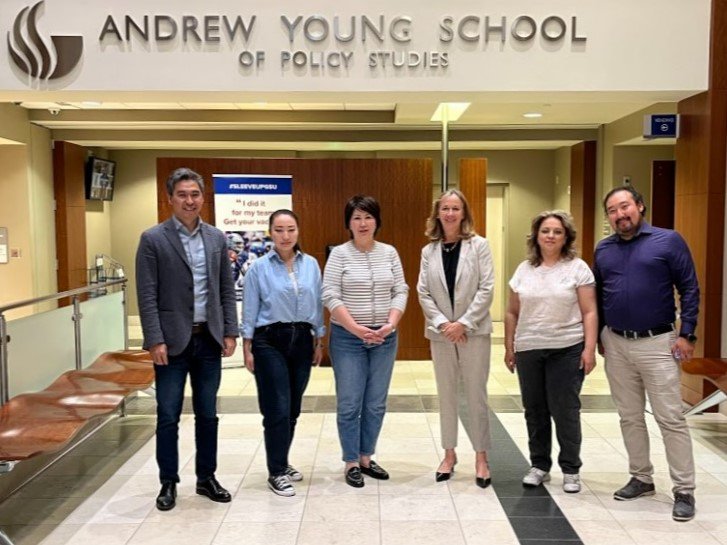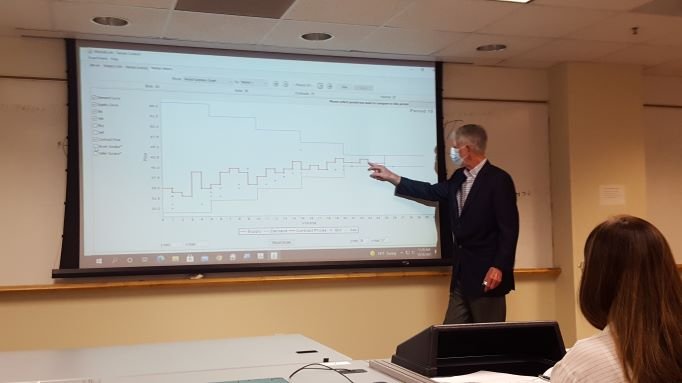|
Cycle 9 (2020 Deadline)
The evaluation of challenges of youth in Kazakhstan and piloting innovative solutions
PI: Aida Sagintayeva (asagintayeva@nu.edu.kz), co-PI Alima Ibrasheva, Nazarbayev University Graduate School of Education
U.S. Partner: James Cox, Georgia State University
Project Dates: April 2021 - March 2023
Project Overview
 | | Group photo with Dr. Sally Wallace, dean of the Andrew Young School of Policy Studies, where ExCEN is housed (from left to right: Zakir Jumakulov, Galiya Yelubayeva, Alima Ibrasheva, Sally Wallace, Marina Tyutyunnikova, Bauyrzhan Yedgenov), October 28, 2021 (Photo credit: Zakir Jumakulov). |  | | Dr. James Cox, the director of ExCEN and PEER team's U.S. partner, giving the introduction on experimental economics and methodology to the PEER research team (October 18, 2021, photo credit: Marolyn Lucy Gentles). |  | | PEER team with GSU team: Bauyrzhan Yedgenov, Alima Ibrasheva, Zakir Jumakulov, Sally Wallace, Marina Tyutyunnikova, Galiya Yelubayeva,), October, 2021 |
Over the last 20 years, the number of NEET youth (youth who are not in education, employment, or training) has decreased, and the government of Kazakhstan has taken
significant measures to regulate and institutionalize youth policies regarding NEET youth, including large-scale government programs to provide systematic support for free education, employment after graduation, business creation, and mentorship assistance for young people in the workplace. However, these programs are undermined by the difficulty of identifying and defining NEET youth in the country. While the methodology is still in development, it is difficult to identify and communicate with youth outside the official tracking system. Approaches used to study this group of young people have so far not been aimed at a deep understanding of their values, needs, and motivations, which creates certain barriers to developing effective interventions for NEET youth. There is also a lack of understanding of large regional and gender differences in the share of NEET youth across the country.
This project aimed to reduce the number of NEET youth by creating recommendations on increasing the efficiency of prevention, outreach, and reintegration policies of the Kazakhstani government. The researchers applied qualitative methods and a literature review to understand the challenges faced by NEET youth in Kazakhstan and implemented innovative methods of experimental economics (laboratory and field experiments) to test various hypotheses and potential solutions. By conducting a thorough review in the global context, the project proposed a better methodology to define NEET, suggest ways to reach out to NEET youth, and work to elevate the importance of the issue in the national Kazakhstani policy agenda.
Final Summary of Project Activities
The PEER project team conducted 25 initial surveys with NEET youth stakeholders, and one researcher undertook a literature review on NEET interventions across 23 countries. Their initial analysis identified some of the main indicators affecting NEET youth: lack of information about employment opportunities, lack of willingness to take on low-prestige blue collar jobs, and low trust in governmental initiatives, among others. Key members of the team made an exchange visit to Georgia State University, where they were able to practice and design field experiments with assistance of their U.S. partners on the GSU experimental team.
Following additional data gathering through focus groups and an adjustment to the researchers’ recruitment strategy, the team undertook a lab experiment where young people were divided into three groups and where they chose white collar versus blue collar jobs under varying wages and scenarios to indicate the discount potential workers put on low-prestige jobs and the impact of peer pressure on job selection.
The researchers also performed a field experiment to test the impact of the information gap on government programs on NEET youth. They sent text messages to selected groups of NEET youth containing information about government programs, particularly those listed on the website Enbek.kz, and surveyed them at the end of the intervention on social and demographic issues, as well as questions to assess their awareness of the program and whether they signed up.
The PEER team presented their results in a conference hosted by Nazarbayev University, in technical presentations, and to Kairat Baimuldinov, chairman of the Youth and Family Committee at the Ministry of Information and Social Developmen
Back to PEER Cycle 9 Grant Recipients
|
|
|
|






